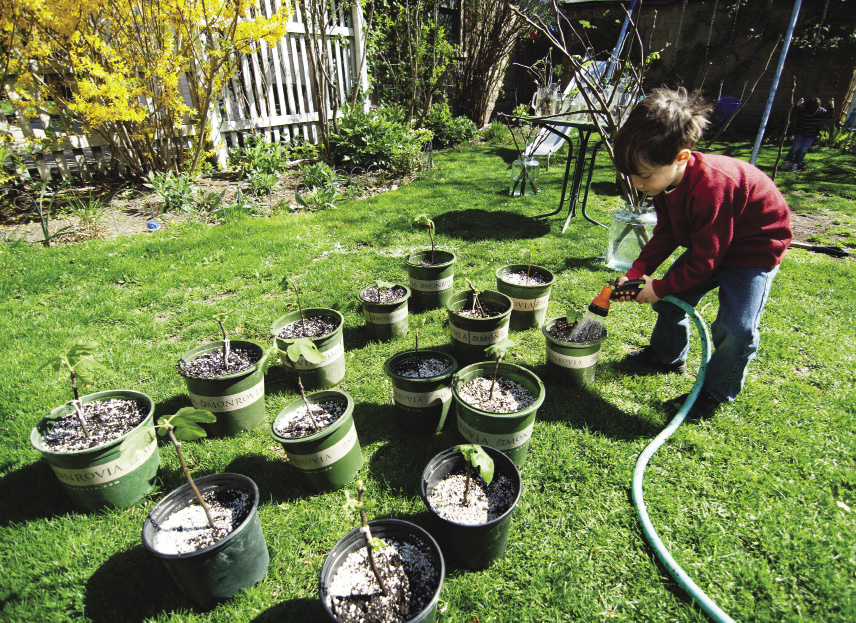Flatbush Fig Farm is the perfect triple-bottom-line business, with one small catch: This year they plan to spend roughly half their profits on a Death Star. But never fear—their Star Wars aspirations are Lego in nature, and the other half of their earnings will be donated to the Flatbush Community Garden.
Nelson Ryland runs the “farm” with his two oldest sons, Jack, 6, and Sam, 4. To date, they’ve sold more than 50 trees and tree cuttings and given away another 40. While most of the trees have stayed local (Nelson is a bit worried the neighborhood is reaching its fig tree capacity), a few have traveled as far as Alaska, Delhi and Germany.
When I visited the company headquarters—a beautiful Victorian house in Ditmas Park—Jack and Sam were busy building a Lego Millennium Falcon, but evidence of agricultural labor was spread out all around them in the form of 100-plus fig tree cuttings in clear glass jars. The transformation from stick to fruit is an easy one, says Sam: “We cut the fig [trees], then we wait until the leaves pop up, then after the leaves on the figs pop, we eat the figs.”
It isn’t quite that fast and easy, but almost. In fact, the farm’s first encounter with fig propagation was accidental.
When Nelson and his wife, Rebekah, moved into their home in late 2005, he cut down a large mystery tree that was crowding the house and threw the branches in their makeshift compost pile. The following year, the discarded branches took root in the compost pile, and the old stump sent up new branches. When dark purple figs appeared on the original tree that September, Nelson realized his cast-offs had delicious potential.
Admittedly not a fig expert, Nelson reached out to online fig forums (yes, they exist), where he ignited a spirited debate over the variety of his tree. There was no consensus, so he named it a Flatbush Dark in honor of the neighborhood. He is quick to extoll its virtues.
“A lot of the figs [trees] that you buy aren’t East Coast winter hardy, but you don’t have to wrap these up in cold weather,” he says. “They are the most forgiving trees ever.”
And the fruit?
“I liked figs, but I didn’t have a big personal connection to them until I started eating these, and they were just so damn good.”
While Nelson’s first harvest of trees was accidental, he now has a system that he uses to propagate both the tree in his yard and a fig tree in his community garden that a neighbor christened a Flatbush White on account of its pale green fruit. He trims both trees during the dormant winter season and places the cuttings in water until they develop a small root system, after which they can be planted in pots.
He decided to turn his discovery into a business a couple years ago as a way to share his love of gardening with his sons while teaching them about responsible entrepreneurship. The farm’s business plan has a lot going for it. Cuttings sell for $20 each and potted trees are $30 or $50 depending on size. The tree cuttings are a free, renewable resource and, according to the fig forums, their product is one-of-a-kind. The pots they use are discards from a local nursery, and even the small metal labels that distinguish the Flatbush Whites from the Flatbush Darks are made from recycled beer cans that Nelson and the boys carefully hammer letters into, one by one, using an antique letter punch. So far soil has been their only expense, but they recently bought a rotating composter with the hope of producing some of their own and buying the rest from their community garden.
But before you buy stock in the farm, you should know they have no plans to expand.
“I’m running out of real estate in my house to do this, and my wife is sort of running out of patience for the whole fig business. But I think there is room on the piano—I think I can get maybe 40 or 50 more cuttings in,” Nelson says.
Distribution is also an obstacle. Nelson has a great relationship with local bar/flower shop Stems (located inside Sycamore), on Cortelyou Road, where he sold 20 cuttings and several trees last spring, but when orders come in from further afield, things can get a bit tricky.
“A guy from New Jersey wanted to buy a fig tree, so I actually had him meet me at my office in Manhattan, and I commuted in with two fig trees on my lap.”
Willing farm labor and the ability to bond with his sons over tree cuttings is another variable that Nelson knows will evolve as the children grow out of their “dad worship” phase and develop new interests. Luckily, his youngest son, Reid, still a toddler, is waiting in the wings to become a full partner in the farm. And, where bonding is concerned, trees are hardly the only interest the Ryland men share.
“We’ve got the vampire castle,” Jack says.
Nelson pulls up a picture of the Lego castle on his iPhone while Sam runs upstairs to get one of their other prized constructions, a green “ninja dragon.”
“The tail is the annoyingest part,” Sam says.
“Because it breaks,” Nelson explains.
The dragon is capable of shooting a marble out of two of its three heads, so an imperfect tail is easy to overlook.
Some of the saplings across the room from the Lego workstation already have knobby buds where their roots are forming. With any luck, the Death Star will be within reach in just a few months.
Photo credit: Nelson Ryland



